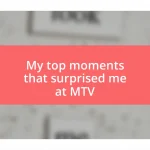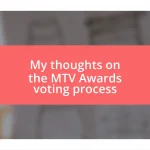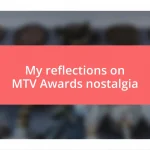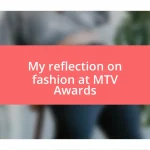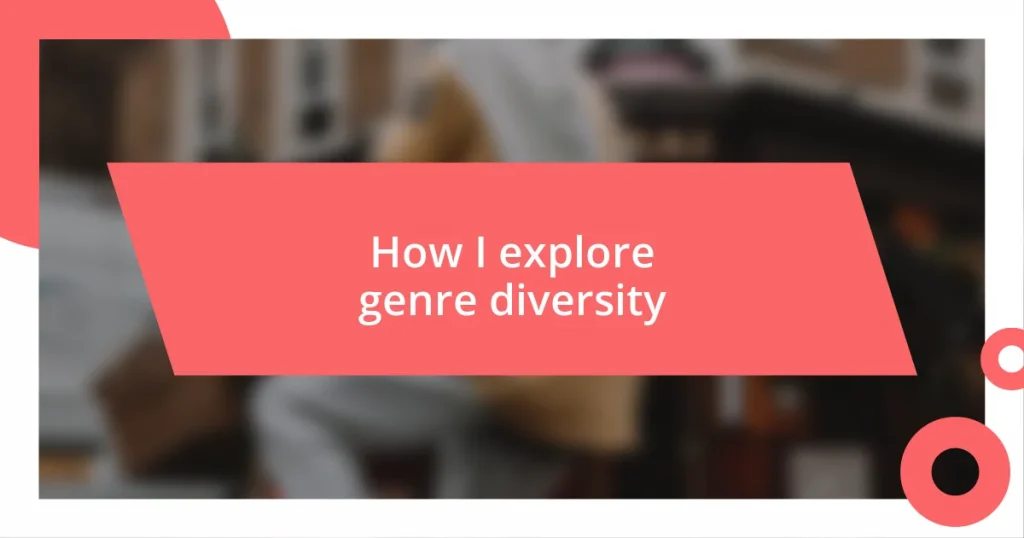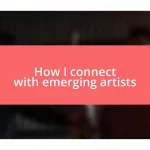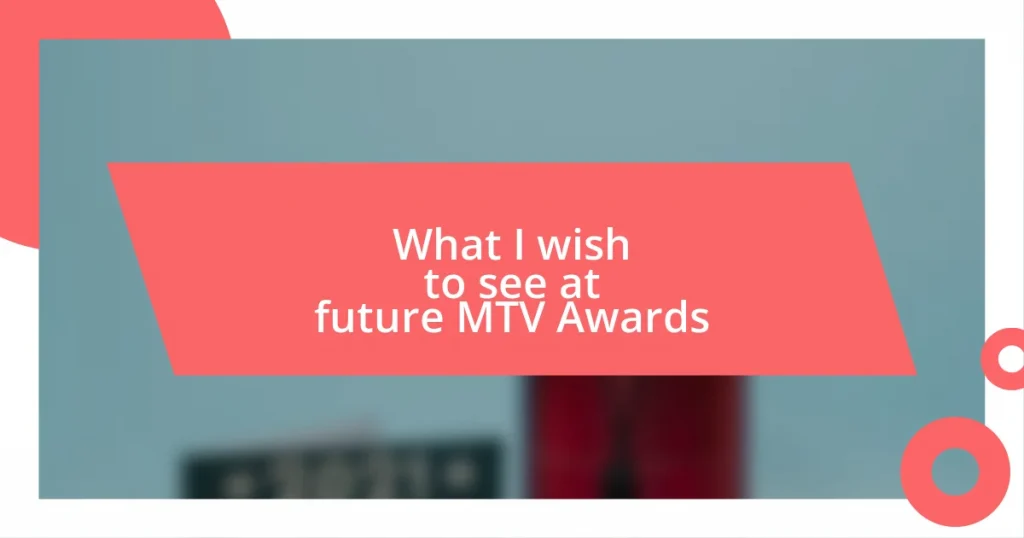Key takeaways:
- Genre diversity enhances personal connections to stories, revealing emotional landscapes and fostering appreciation for different perspectives.
- Engaging with genre-specific communities deepens understanding and allows for meaningful discussions around storytelling techniques and personal connections to narratives.
- Exploration of genre crossovers challenges preconceived notions, reflecting cultural shifts and enriching the reading experience through blended narratives.
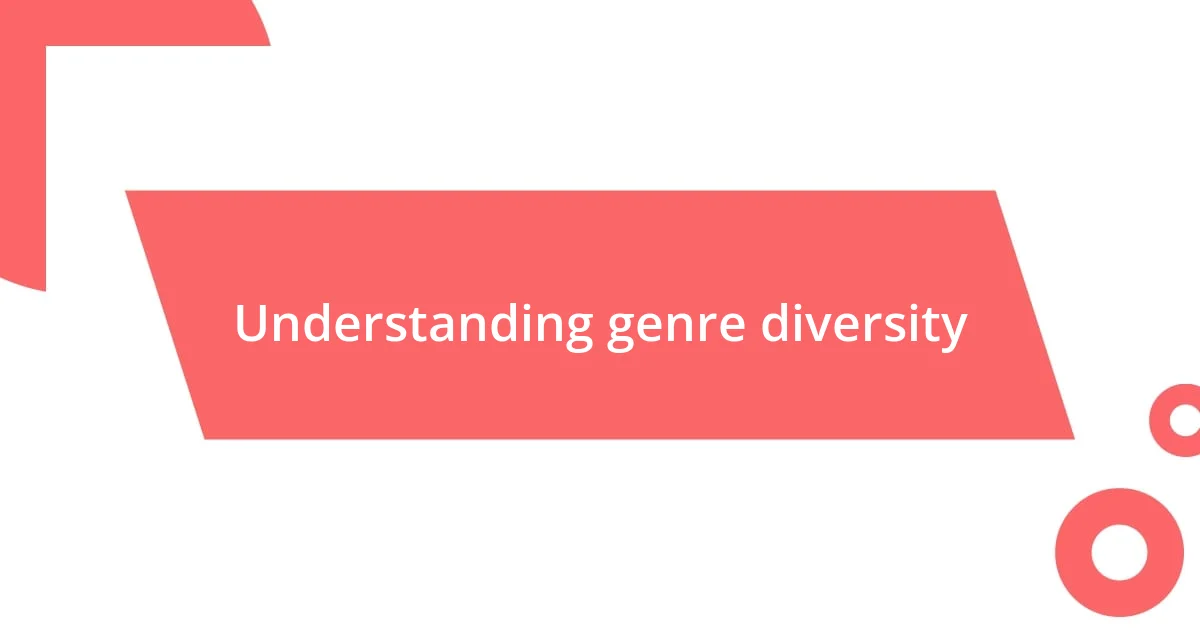
Understanding genre diversity
When I think about genre diversity, I can’t help but remember the first time I picked up a graphic novel. At that moment, I realized that storytelling isn’t confined to traditional formats; it can be visual, lyrical, and deeply immersive. Have you ever felt transported by a genre you didn’t initially think you’d enjoy? Exploring different genres can reveal hidden gems that resonate with us on profound levels.
Understanding genre diversity goes beyond mere categories like fiction, non-fiction, mystery, or fantasy. It involves recognizing the unique emotional landscapes that each genre offers. For instance, I often find solace in memoirs, as they share intimate experiences that mirror my own struggles. It’s fascinating how a well-crafted narrative can make you feel less alone, don’t you think?
I’ve had moments where switching genres has completely changed my perspective on certain topics. After diving into historical fiction, I felt a new appreciation for events that initially seemed dull in textbooks. The characters brought history to life in a way that was relatable and engaging. Isn’t it incredible how genre diversity has the power to enrich our understanding of the world around us?
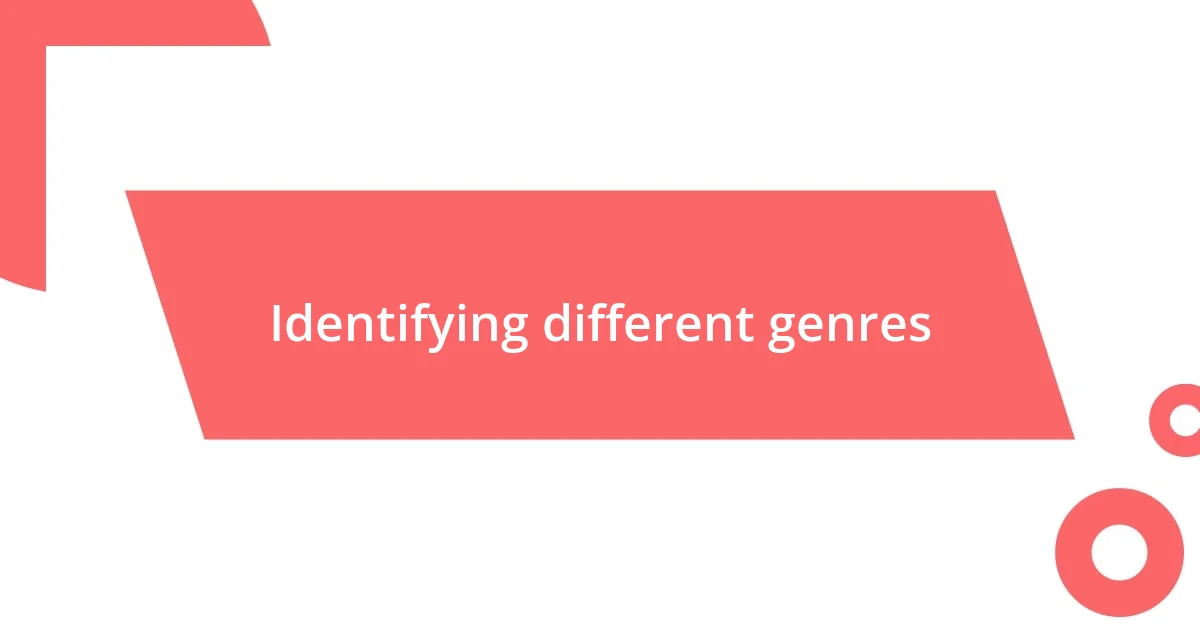
Identifying different genres
Identifying different genres is like opening doors to various worlds. Each genre has its own language and style, allowing readers to connect on different emotional levels. I remember picking up a horror novel one chilly evening; the way the author built suspense was unlike anything I’d experienced before. It wasn’t just the scares—it was the rush of adrenaline and the thrill of diving into the unknown that made it unforgettable.
When you dive into identifying genres, consider these factors:
- Themes: What central ideas does the genre explore?
- Tone: Is it light-hearted, somber, or thrilling?
- Format: Does it include illustrations, poetry, or is it purely prose?
- Audience: Who is the genre typically aimed at?
- Character Development: How are characters portrayed and evolved over time?
In my exploration, I find that recognizing these elements not only enhances my reading experience but also helps me discover genres I might have overlooked, sparking new interests along the way.
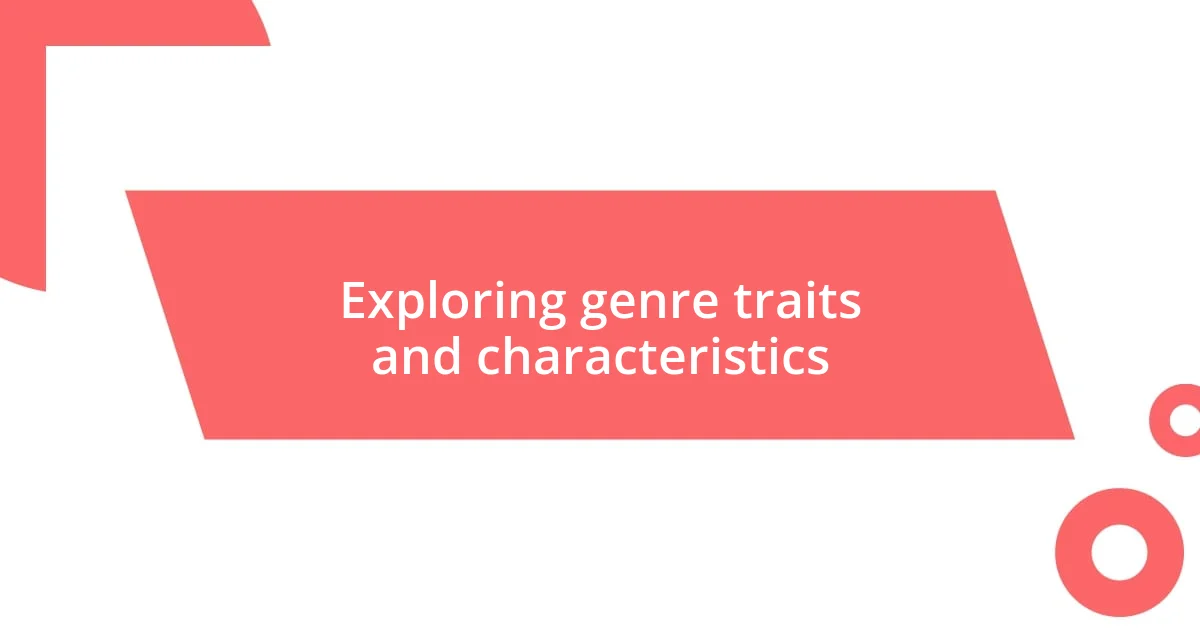
Exploring genre traits and characteristics
Understanding genre traits is essential for appreciating the depth and breadth of stories available to us. I remember when I first delved into science fiction; the blend of speculative ideas and intricate world-building was mesmerizing. Engaging with genres allows me to understand not just the structure of storytelling, but also the cultural nuances reflected in them.
Each genre offers distinct characteristics that shape the way we connect with a narrative. For instance, in romance novels, the development of relationships often takes center stage, immersing readers in emotional highs and lows. In contrast, thrillers are marathons of suspense, keeping me on the edge of my seat until the very last page. Have you ever lost track of time while reading a gripping thriller? It’s a reminder of how compelling genre traits can captivate our attention and evoke powerful feelings.
When exploring genre traits, it becomes clear that each one employs specific narrative techniques to engage readers and convey themes. For example, fantasy often includes rich, imaginative settings with magic systems that create entirely new realities. I once found myself fully absorbed in a fantasy series, where the detailed lore and complex characters felt like stepping into a living dream. The emotional impact of such genres can linger long after the last page is turned, illustrating why our diverse literary landscape is so important.
| Genre | Key Traits |
|---|---|
| Science Fiction | Speculative ideas, advanced technology, often sets in the future |
| Romance | Focus on emotional relationships, character development following relationship arcs |
| Thriller | Fast-paced, suspenseful, twists and turns that keep the reader guessing |
| Fantasy | Imaginative settings, magical elements, complex world-building |
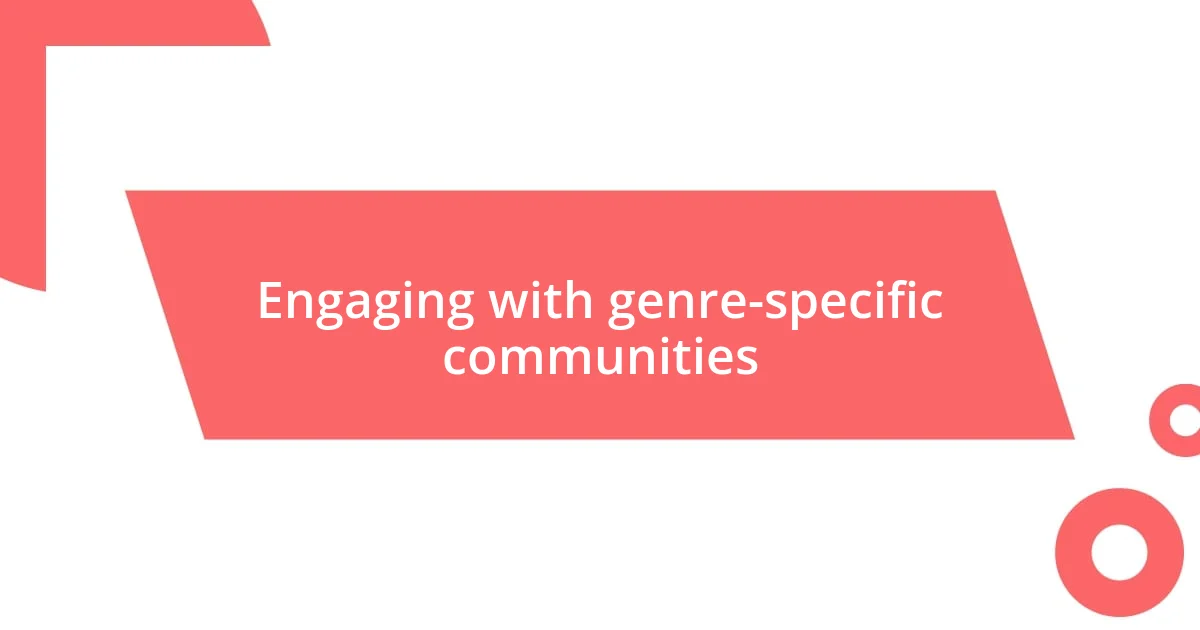
Engaging with genre-specific communities
Connecting with genre-specific communities has been a game-changer for me in understanding the nuances of different writing styles. I vividly recall attending a local horror book club where discussions led me to appreciate the craftsmanship behind creating fear. It was intriguing to hear fellow members share their chills and thrills, making me realize how collaborating and conversing with others deepens my own insights into a genre.
I often find that these communities provide a safe space to explore not just the stories but our personal connections to them. One afternoon, while participating in an online fantasy forum, I encountered a member who shared an emotional backstory tied to their favorite epic. I couldn’t help but reflect on my own attachment to certain fantasy worlds. Have you ever felt a story resonate with your life experiences? I believe engaging with others allows us to uncover layers of meaning we might not discover on our own.
Social media has also opened doors to broader discussions about genre. I remember joining a Twitter chat focused on young adult literature. It was electrifying to see how diverse perspectives came together to celebrate varying themes and character arcs. Each tweet felt like a spark of creativity, and the insights exchanged were invaluable. Hearing from others, I learned that genres are more than labels—they’re vibrant communities where readers and writers alike can share their passions and grow together.
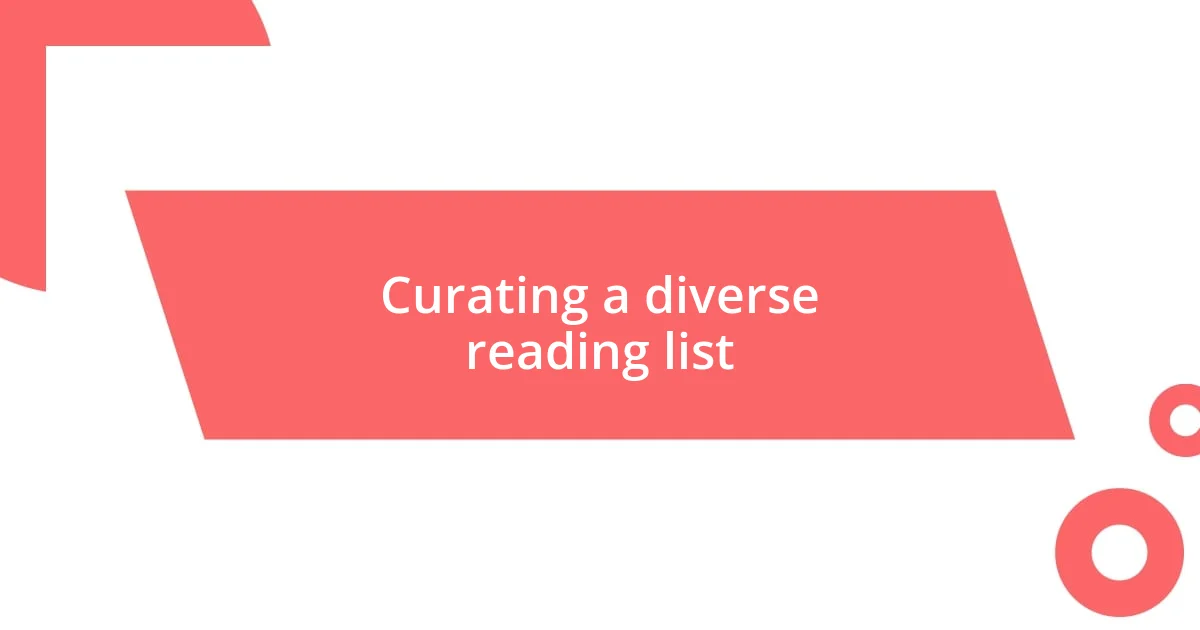
Curating a diverse reading list
When curating a diverse reading list, I find inspiration in the recommendations of friends and fellow readers. Recently, a friend suggested a graphic novel that opened my eyes to the power of visual storytelling. It was a refreshing departure from my usual preferences, and I realized how much I had been missing out on by sticking to familiar genres. Have you ever discovered a newfound love for a genre just by stepping out of your comfort zone?
Another strategy I adopt is creating themed reading months, where I focus on a different genre each time. For example, one month was dedicated to memoirs, and I was deeply moved by personal stories that reflected diverse experiences and cultures. This practice not only broadens my understanding of different perspectives but also fuels my curiosity to learn more about the world. What’s stopping you from exploring genres that you’ve never considered before?
Lastly, I prioritize seeking out authors from varied backgrounds, which greatly enriches my reading experience. I remember picking up a novel by an Indigenous author, and the unique cultural nuances resonated with me in unexpected ways. It was as if I was invited into a world I had barely known existed. Incorporating diverse voices into my reading list not only enhances my understanding of different cultures but also challenges my worldview, encouraging me to think critically about the stories we tell and how they shape our society. How has your reading journey influenced your perspective on different cultures?
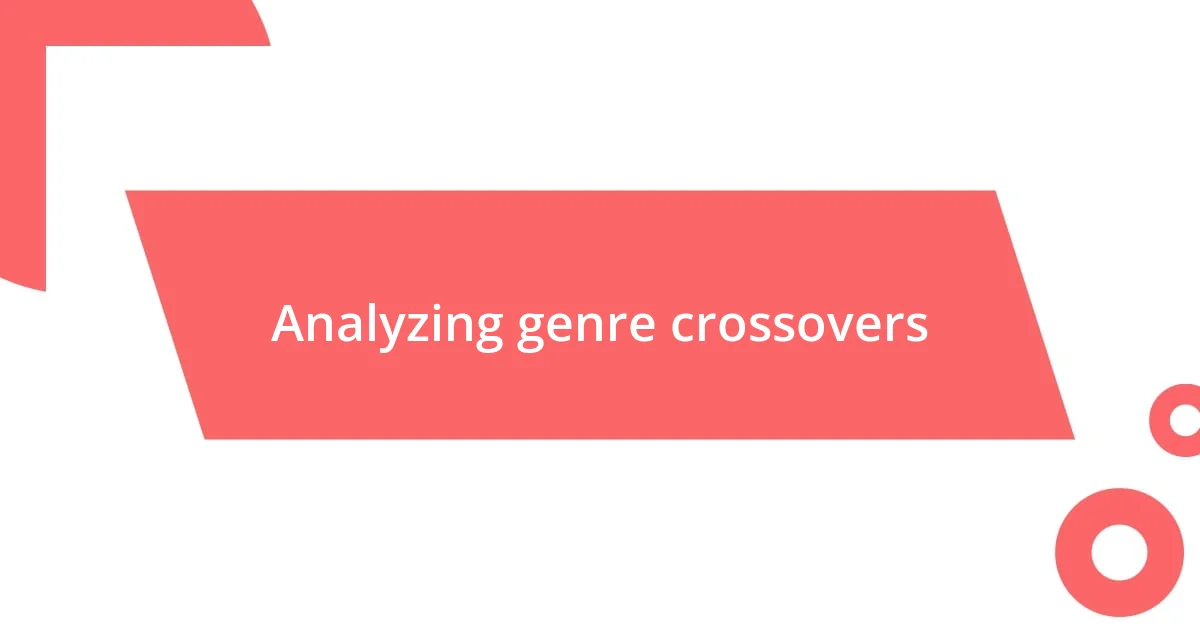
Analyzing genre crossovers
Analyzing genre crossovers often reveals fascinating intersections between storytelling techniques, character development, and thematic elements. I remember diving into a novel that seamlessly blended romance with elements of science fiction. It was refreshing to see characters grappling with love while navigating interstellar challenges. Have you ever found yourself caught off guard by the depth of emotion in a seemingly unrelated genre? This curiosity about genre hybrids deepens my appreciation for the art of writing.
The beauty of genre crossovers lies in their ability to challenge preconceived notions about storytelling. Recently, I encountered a mystery novel that incorporated elements of magical realism, and it felt like stepping into a dream. I couldn’t help but marvel at how the author wove in magical components to elevate suspense and intrigue. It raised a question for me: how can blending genres push boundaries and create richer narratives? This exploration invites readers to venture beyond traditional classifications, leading to a more nuanced understanding of literature.
What strikes me most about analyzing genre crossovers is the way they reflect cultural shifts and societal changes. I experienced this firsthand while reading a graphic novel that combined horror and humor, highlighting societal issues through satire. It was both unsettling and enlightening, urging me to question why certain themes resonate differently across genres. Do you ever find genre-blending to be a mirror of contemporary life? Understanding these connections enriches my reading journey and opens doors to discovering new layers of meaning.
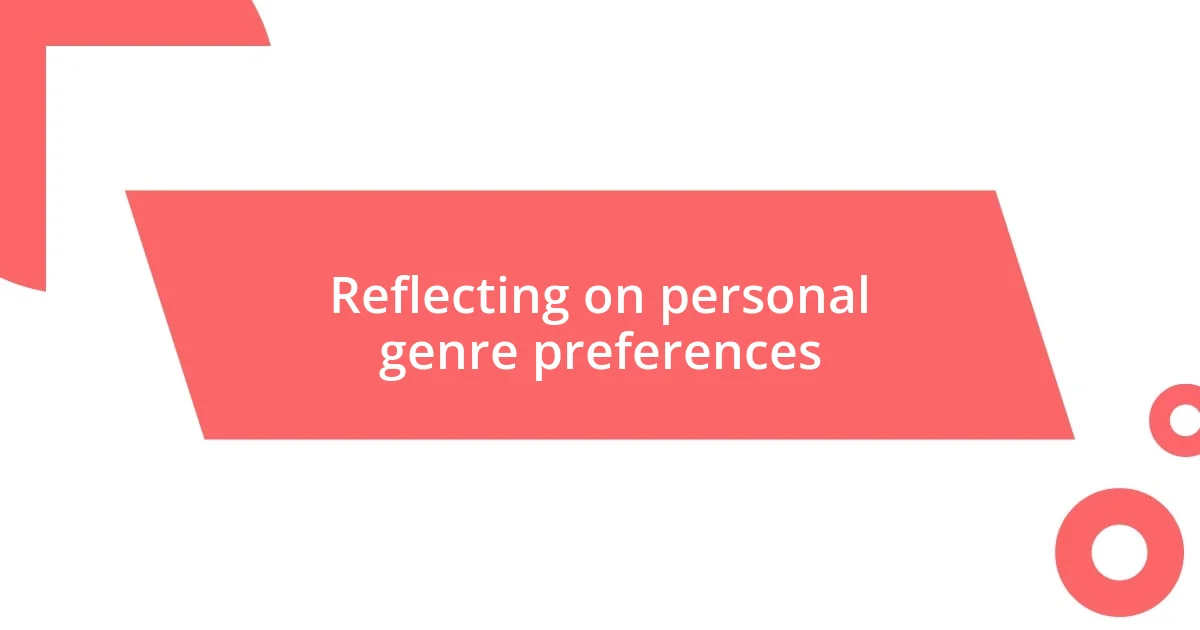
Reflecting on personal genre preferences
Reflecting on my personal genre preferences, I’ve often found myself gravitating toward narratives that resonate with my experiences or emotions. For instance, I used to shy away from horror because I believed it would be too intense for me. However, after giving a particular psychological thriller a chance, I was surprised at how much I appreciated the tension and the way it mirrored real-life anxieties. Isn’t it interesting how a genre you thought you wouldn’t enjoy could reveal deeper facets of your own emotions?
I also notice that my preferences evolve in tandem with my life experiences. A few years ago, I was deeply engulfed in young adult fiction, especially stories about self-discovery. They felt relevant during a transitional phase in my life. Recently, I’ve shifted towards historical fiction, as I’m drawn to narratives rich in detail and context. This change makes me wonder: how do our current circumstances shape our literary tastes?
There’s a certain thrill in allowing my preferences to be fluid; it feels like embarking on an adventure each time I pick up a different genre. One day, I might crave the comfort of a romantic comedy, while on another, I might dive into a complex literary fiction piece. It brings to mind a question: is there a right or wrong genre to explore? Personally, I think the real joy lies in the journey of discovery and understanding the vast landscapes that literature offers. Each genre is a new world, waiting to be explored.






